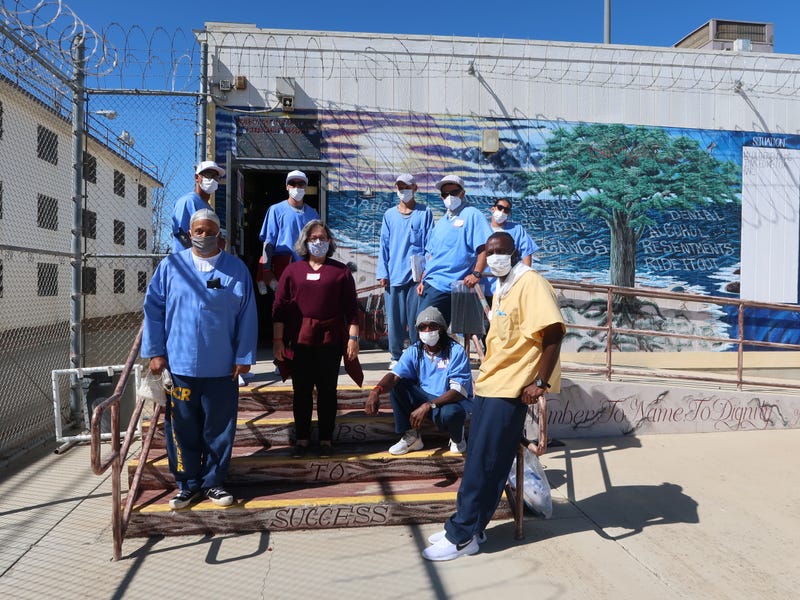
Editor's note: Crime in the Bay Area, and around California, has attracted national attention in recent months.
San Francisco's recall of former District Attorney Chesa Boudin shined a spotlight on the debate about how to increase community safety, prevent criminals from reoffending and protect victims.
In this series of special reports, KCBS Radio will examine the innovative approach of an East Bay nonprofit called the Ahimsa Collective.
In Part 1, KCBS Radio's Kathy Novak takes us on a journey with a group of survivors of crime.
Warning: References to violence in these stories might be upsetting to some readers.
For more, stream KCBS Radio now.
SOLEDAD, Calif. (KCBS Radio) – A prison might seem like an unusual place for a survivor of violent crime to go for support.
As we drove up to the Correctional Training Facility, better known as Soledad State Prison, Patty O'Reilly explained why she had come all the way from Sonoma to share her story.
"In that circle, it’s a very deep sharing," she told KCBS Radio, "And even after six months, people really didn’t want me to be crying around them any more."
Patty is part of the "Empathize" program, created by the Ahimsa Collective, which is named after the Sanskrit word that means nonviolence and non-harm.
Survivors of crime sit in a circle with people who are serving long prison sentences for committing similar crimes.
"I'm Patty," she began. "And on April 19th of 2004 my husband, Danny, was hit and killed by a drunk driver."
For the next hour, she told the incarcerated men what happened almost 20 years ago. She opened her front door one day and found a business card with a note telling her to call the sheriff's office. A deputy came over to break the news that Danny had been hit while riding his bike.
Then, Patty had to explain what had happened to her two young children.
“I hated him,” she said about the man who killed Danny. “I thought he should be locked up forever.”
Another crime survivor, Elle O'Dowd, joined Patty on this visit. Elle showed the group photos of her daughter, Emily, who was hit by a drunk driver when she was walking home from work at the age of 24.
"It was his seventh DUI," explained Elle, "He'd already served two five-year terms for felony DUI, which means he probably hurt other people."
The idea of the program is to show the incarcerated people the real impacts of their actions, including on people they might not have considered, like Patty's children.
Patty read from a card that one of them made for the man who killed their father.
"She says, 'Dear Mr. Albertson, today is the 16th of August and I will be 10 years old on September 1st. I just want to make sure you know that I forgive you.' "
Patty eventually forgave him too – not for him, but for herself and her children.
"I could just feel this venom and poison in me," she explained, "And I knew that if I didn’t forgive him that poison wasn’t going to harm [Mr.] Albertson, it was going to harm my daughters."
Elle said that after the initial shock, she had questions – especially because her own family struggles with alcohol abuse.
"And I knew that this man who had done this thing – if he had seven offenses, that meant he had some significant trauma in his life," she told the group, "and I wanted to know what that was. I wanted to know about him."
The Ahimsa Collective helped Elle work with the Office of Victim and Survivor Rights and Services in the California Department of Corrections and Rehabilitation to set up what is known as a Victim-Offender Dialogue.
Elle explained that even though she had mixed emotions about meeting the man who killed Emily, she realized how much courage it must have taken for him to sit across from the mother of the woman he had killed.
"It said more about who he was now than who he was then, if he said yes," she said. "He just became a human being to me at that point. He kind of stepped out of the shadows."
Eventually, Elle went to meet him in person at San Quentin State Prison.
"He was hunkered down and he couldn't look at me," she recalled. "And I walked over to him, and I gave him a hug and he cried on my shoulder."
They talked on that day for five hours and stayed in touch after that first visit.
"He was a monster for a long time, and I felt great anger towards him," said Elle. "And then to see him and to be with him and to hear his story – he was not a monster. He was just a wounded broken human being who was trying to deal with pain that was a horrible pain."
After hearing those stories, some of the incarcerated men told the group how they felt after hearing the stories.
"It's so devastating to hear, too, that I caused that to a family as well," said one man.
Another said, "When I was out there in the streets, I was no different. I was drinking, I was driving, I was living an irresponsible life. Not caring for anyone in the world. No one. And I know I harmed a lot of people."
Special Reports from Soledad State Prison
PART 1 | PART 2 | PART 3 | PART 4 | PART 5
DOWNLOAD the Audacy App
SIGN UP and follow KCBS Radio
Facebook | Twitter | Instagram

